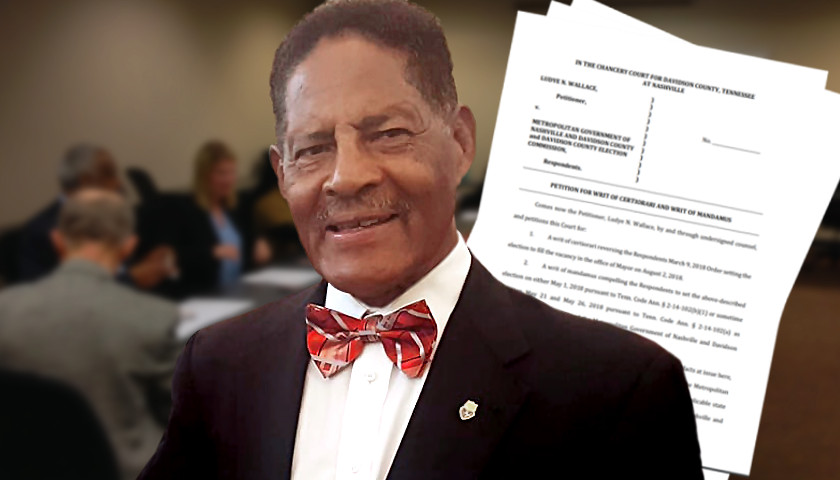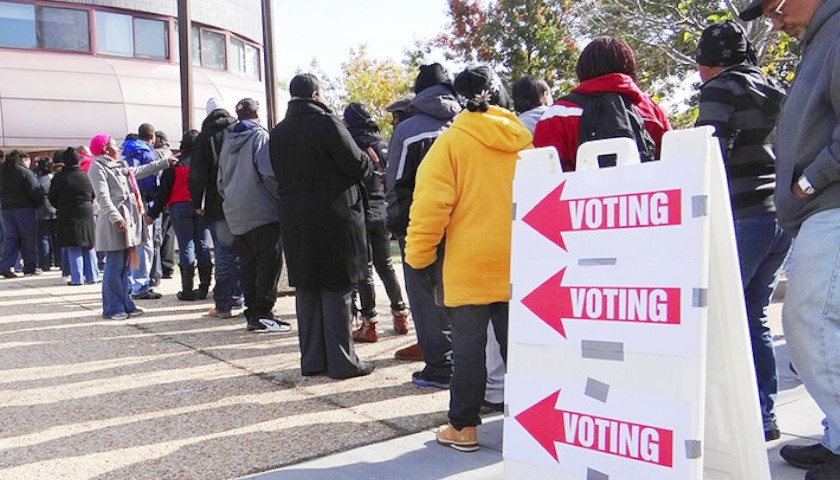Nashville attorney Jamie Hollin filed a lawsuit Monday morning in Davidson County Chancery Court on behalf of mayoral candidate and former Metro Councilman Ludye Wallace challenging the legality of the Davidson County Election Commission’s decision to set the date for the mayoral election as August 2.
Wallace was listed as the plaintiff in the case, and the Metropolitan Government of Nashville and Davidson County and the Davidson County Election Commission were named as defendants.
“Three of the five members of the Davidson County Election Commission ignored the plain meaning of Tennessee law and voted to set August 2, 2018 as the date for the special election to select a new mayor of Nashville late Friday afternoon, thereby plunging the city into a likely firestorm of lawsuits and threatening the legitimacy of an election held on that date,” The Tennessee Star reported last week:
Commission Chairman Jim DeLanis, Commissioner Jesse Neil, and Commissioner Emily Reynolds, all Republicans, formed the three member majority who voted in favor of the motion to set the election date at August 2. Commissioner Tricia Herzfeld and Commissioner A.J. Starling, both Democrats, formed the two member minority who voted against the motion.
Wallace, who served on the Metro Nashville Council from 1975 to 1995, and again from 1999 to 2007, currently serves as the president of the Nashville branch of Tennessee’s NAACP.
Like former Mayor Barry and acting Mayor Briley, Wallace is a strong supporter of the $9 billion transit plan proposal which, should he prevail in court, will be on the ballot with him on May 1.
Hollin filed a ‘Petition for a Writ of Certiorari and a Writ of Mandamus’ on behalf of his client Wallace.
A ‘Writ of Certiorari’ is usually used at the appellate court level to inform and persuade the appellate court to review a decision by a lower court and take specific action based on a fuller understanding of fact. (In Latin, certiorari means ‘to be more fully informed.’) A Writ of Mandamus–as many ‘Law and Order’ viewers know–is an order by the court to an official to perform a duty not recognized as containing any element of discretion.
Hollin also filed a Brief in Support of the Motion for Extraordinary Relief and Expedited Hearing on behalf of his client Wallace, which more fully explains the need for the court to act.
It is unclear when the defendants, the Metropolitan Government of Nashville and Davidson County and the Davidson County Election Commission will file a response, or how quickly the court will issue a ruling on the case.
You can read the Petition for a Writ of Certiorari and a Writ of Mandamus here:
[pdf-embedder url=”https://tennesseestar.com/wp-content/uploads/2018/03/Nashville-Mayor-Election_Petition-for-Writ-of-Certiorari-1.pdf” title=”Nashville-Mayor-Election_Petition for Writ of Certiorari (1)”]
You can read the Brief in Support here:
[pdf-embedder url=”https://tennesseestar.com/wp-content/uploads/2018/03/Mayor-of-Nashville_Brief-in-Support-of-Motion.pdf” title=”Mayor-of-Nashville_Brief in Support of Motion”]
The Star reported on the legal arguments for the May 1 date versus the August 2 date for the special mayoral election last week:
The timing of that special election is established in black letter law in Section 2-14-102 of the Tennessee Code Annotated, as The Star reported previously:
(a) Special elections shall be held not less than seventy-five (75) days nor more than eighty (80) days after the officer or body charged with calling the election receives notice of the facts requiring the call. An election for an office shall be held on the same day in every county in which it is held. (Emphasis added.)
(b)(1) If it is necessary to hold a special election to fill a vacant seat in the United States house of representatives, a vacancy in a county office, or a vacancy in any municipal office, and the date for such election, as established under subsection (a), falls within thirty (30) days of an upcoming regular primary or general election being held in that district, the governor, or the county election commission, as specified in § 2-14-103, may issue the writ of election for the special election for the date which will coincide with the regular primary or general election. (Emphasis added.)
The Davidson County Election Commission was notified on March 6 of the vacancy, so it had the authority to set the special election from 75 days (May 21) to 80 days (May 26) subsequent to that notification, or, alternatively on May 1, the date of the mass transit referendum and the primary election for municipal judges and the sheriff in Davidson County, which is within the 30 day window from May 21 to May 26.
But Metro Legal Department attorney Nicki Eke and Commission Chairman DeLanis, an attorney currently of counsel with the prestigious law firm Baker Donelson, insisted that a precedent was established in the 1983 Tennessee Supreme Court Case of Wise v. Judd that changes the plain meaning of “general metropolitan election” as understood in both the Metro Charter and Tennessee statutes.
They argued that the opinion in that case defined a “general metropolitan election” as either the quadrennial election of the mayor and city council members (which will next be held in August 2019) or the quadrennial election of municipal judges and the sheriff (which will next be held in August 2018).
“The next general metropolitan election, based on case law, is August 2018, which is less than 12 months,” Eke said. Notably, Eke did not make the assertion that “the next general metropolitan election . . . is August 2018” based on the plain meaning of the Tennessee statutes and Metro Charter.
Sources tell The Star that additional lawsuits are expected to be filed challenging the August 2 date for the mayoral special election.








